Vincent Medina Horše ṭuuxi, kaanak raakat Vincent Medina ‘at kaanak halkin ṭaareš, kaanamu ‘ek-maknon ‘i-raakat Louis Trevino, waaka ‘i rumsen ṭaareš.
So hello to you all. My name is Vincent Medina. I’m Halkin man from the Halkin region here in the East Bay. I’m here with my partner, Louis Trevino, who’s Rumsen Ohlone from the Carmel Valley.
Louis Trevino There an elder in the Rumsen community named Gloria Castro. And she is my great grandfather’s first cousin. She remembers my great, great, great grandmother and all the generations. Since then, when Gloria went to school with her sister, it was a one-room schoolhouse and her sister and her were always forced by their teacher who was a white woman to stay back while all the other kids went inside.
And she and her sister were made to wash their hands and their arms up past their elbows every morning before they were allowed into the schoolhouse. And the teacher in front of all of the other students said that you need to clean yourselves because you’re dirty Indian. So, that generation endured those kinds of things, that false sense of shame and pain was put on them. And yet, when she would go home to her mother and her father and her grandfather, her grandfather would always say, “Never forget that you are a princess and that you are valuable and that you’re beautiful.”
So, that’s how our family made it through those things was through kindness and through love for one another.
And that’s a central value that the love that Vince and I have for one another here in our home. The love that we have for our grandparents, that they have for us, that love is what kept everything together. It’s what helped us survive all of those hardships. It is very clearly a value that extends well into the past.
Dacher Keltner Today, it is an honor to be joined by Louis Trevino and Vincent Medina, two members of the Aloni tribes on lands, right around me, stretching from the San Francisco Bay and Northern California’s Big Sur. I’m Dacher Keltner, and this is the Science of Happiness.
Vincent and Louis join us today to talk about, really, what you could think about as one of the deepest and enduring of happiness practices, which is how we gain wisdom from our elders, which when we think about our own lives today in parts of our culture it’s often lacking or very impoverished.
Vincent and Louis interviewed their elders and studied Ohlonw recipes from the early nineteen-hundreds, and they created Cafe Ohlone, which is a pop-up restaurant in Berkeley, California, which has now moved online since the spread of COVID 19.
Louis and Vincent, I want to thank you for taking time out of your day and joining us today.
So you created cafe Ohlone, a pop-up restaurant, serving native foods in Berkeley, California. What led you to do that?
Vincent Medina It came from these feelings of wanting to see our culture being reflected in the way that we know that it should be the way that our elders, that our ancestors have always wanted for us.
So, what we did was we started off slow and we started off by asking a lot of questions in respectful ways, you know, and asking about the old ways about those old foods. And, it turned out that those foods just like our language, they were so close to us. Like, it answered a lot of questions, as well, like, um, Louis’s grandmother, Marylou Yamas often talks about Yerba Buena tea and the good flavor of it.
And then when we started to ask about old family memories from elders that are still alive, they’ll talk about those foods and about their parents making them, how delicious they are.
Learning about my great grandmother and the food she would gather somebody who I love and respect, Mary Archuleta, gave me, uh, again, so much good feelings in this to know how close this is.
So after you know how close they are to you, you want to try it because inherently, you know, that these foods are just, they’re our cultural foods. They’re uniquely ours. They’re indigenous to us.
Dacher Keltner Can you give me an example?
Vincent Medina Yeah, one of the most traditional foods. That we eat is acorn bread. And this process that involves shelling them and mortars involves skinning them, involves making them into a flour and you constantly have to re-grind them because our elders, they have such high standards that come from the generations before. If there’s any chunks, they’ll call you out on it.
Dacher Keltner You know, when you were making your foods for your restaurant or developing your recipes out of this recorded history of your people, did you try out some of the recipes on your elders?
Louis Trevino Oh yes. Well, we prepared the acorn bread. Our elders always get that first try. Whenever we find something in those notes, which we recorded in the 1920s and thirties.
Acorn bread is one of those. Those people who are describing it, they having had it when they were young. So these were people in their nineties and they were young was in the 1840s. And when they describe these things, those people who made that food for them, when they were young, I had passed away in the 1880s, but they hadn’t had it since then, but they say how delicious it was and how much they would like to have it again.
And what our elders have these food, like the acorn bread. When my grandmother came and visited our home, she loved it. It was her first time having acorn bread. She knew that it was a food, that it was our food, but this was her first experience with it. And she’s in her seventies. It was just a very beautiful experience here at home.
Dacher Keltner You know, there’s this emerging scholarship, you know, the 21st century world is so fragmented in terms of family relationships and how hard it is, for example, when I was raising my daughters to, you know, have quality time with their grandparents who were far away, and there’s a lot of work now showing how essential elders are to wisdom, to growth, to children, you know, how important those conversations you guys are talking about of, you know, just learning and feeling the affection.
I’m really curious, just how you would talk about a cross-generation relationship you have to the elders in Ohlone community. What’s it like?
Vincent Medina It’s very organic for us. It’s just part of our very strong family structures. Even after colonization. I know for myself, I would spend, by choice, every summer with my grandmother.
She was the accountant of the family restaurant and I would just stay in her office and she set up a little desk for me and I would help her count. She would also just tell me just endless stories about when she was young about her experiences and some of the hardship that she endured in her lifetime, about the experiences that her father had being raised by his grandparents because his parents passed away when he was just a baby. And so there was always a lot there and it always just felt so natural, but it also, even as I was young, it felt like something that was connecting me to something very, very old.
Our elders, even today, we’ll talk about, and we talk about very frequently, “the people from before,” that’s an expression that comes up all the time when we talk with our elders, when we communicate things to our relatives. And, what that expression means. Cause that expression also shows up in those documents from the twenties and thirties, it is clarified in those notes that, that expression, “the people from before,” refers to people who not even our great grandparents can remember.
And so for us, maintaining that relationship with those elders who are still with us, who remember these things, it’s just sort of built into Ohlone society.
Dacher Keltner One of my favorite projects that a lot of schools do right now is, you know, go talk to an elder and, you know, and they travel out and see grandfather or grandmother. And I don’t think we have the regularity of these conversations in Western European culture. And, what do you think are some of the words of wisdom about how a young person should talk with an elder?
Vincent MedinaWhat we would recommend is just going with not expecting anything, going just to check-in, how they’re doing. Cause that’s the main reason in our minds that people should go to check on their altruism is to see how they’re doing and to, and to be able to check-in on them and, and just be a force of good that’s there. And most people will be receptive to that, want to be able to,= to know that others are thinking of them and others love them.
And also, if people know that they’re, that’s wanting to start a dialogue, to be able to start that in a way that’s natural and organic. But also be respectful, if people don’t want to have a dialogue as well. There’s often times that, you know, that people have gone through hardships that they don’t want to talk about.
And so, if the premise of why you’re going is just to go as a force of good to show love, to show kindness, be there as, as a younger, relative checking in on an older generation. And showing respect that’s the most important thing is, you know, I feel like there’s, uh, so much frustration that we can feel when we see how some elders are treated.
You know, like how in Western way, how, you know, there’s these, these homes that people are sent to, you know, even if they don’t want to be there, or people are often seen as being an afterthought. And I always, I know that there’s always context that’s there. So that’s what the elder wants, you know, sometimes. And we can’t judge that. We’re not.
But, we also know that there is a pattern that’s here in Western society of elders being mistreated. And that’s in complete contrast to the way that we were raised, where our elders are the most respected ones in our community. They’re the ones who have the knowledge, they’re the ones who teach us.
And they’re the ones as well that we go to for answers and for permissions. If there’s people out there who wanted to start a conversation with their elders, I would say go with a lot of respect with good intentions, not expecting much, but just wanting to go with a full heart to, to see how those people are doing. And to do that with a lot of love and care.
Dacher Keltner You know, we’re talking today, amidst all kinds of challenges we’re dealing with. A pandemic, a recession, white supremacy and racism in our society. When you consider your own culture’s history, what gives you hope? And what lessons can you share with us?
Vincent Medina We know that it’s a fact that, that our people experienced injustices and hardships they should have never had to experience, but they survived those things through being together. They survived them through sharing. God’s love with one another, feeding one, another providing for one another. They banded together to protect one another. And one of the things that gives me so much hope and a note for Louis, and I know for our family, I know this is reinforced with teachings from our elders, is that the challenges of the moment that we’re in, whatever the challenges are and whatever the moments.
That there’ll be passed. We need to take a long view of history. And that long view of history reminds us that challenges can be overcome and that tomorrow always has the potential to be brighter than today, always has the potential to be better than the conditions that we’re in at any given moments that are hard for us.
And that gives us such a model for any challenge that we face.
So, you know, compassion, love, seeing yourself in one another. Those are things that we know help people get through those hard times. All credit goes to those generations before who really allow us to be able to keep these ways strong.
Dacher Keltner Well, I’m going to thank both of you for your work and for being on our show and I can’t wait after we’re out of COVID to have some of that acorn bread it sounds incredible. So tha nk you, Vincent and Louis.
Louis TrevinoThank you. Thank you for the time that we had together.
Yuria Celidwen Most cultures have some type of contemplative practice, but when these practices are brought to the West, they lose the collective intention of the original wisdom tradition, and becomes very focused on what it is for the wellbeing of the individual.
Dacher Keltner More on what the Science of Happiness can learn from indigenous traditions, up next.
Yuria Celidwen I grew up in the highlands of Chiapas, Mexico in the second valley of Ocosingo, and that’s the name of the town, [on family land called El Paraíso].
My grandma was a medicine woman, so she was profoundly attuned to all the cycles of nature. I learned a lot about life with her. She was really my first contemplative teacher. Of course we never called it contemplative practice or anything like that.
But, but it was exactly that.
Dacher Keltner Yurira Celidwen is a cultural psychologist, who’s also a native of indigenous descent from Chiapas, Mexico. Her work fuses training in Western psychology with expertise in indigenous traditions. Yurira, thanks so much for joining us on the Science of Happiness.
Yuria CelidwenSo lovely to share experiences here, Dacher.
Dacher Keltner There’s a lot of scholarship in anthropology and cultural studies and indigenous peoples in different parts of the world and they really zero in on how the elderly just bring it and give health to the community, to younger people, you know, mental health, physical health, what are some of the things that they do that makes communities stronger?
Yuria Celidwen Well, our elders are the holders of tradition. They are the ones that transmit the secrets of wisdom, if you will, of how to better adapt and better interrelate with all of the existence. My grandma taught me how to be with, communicate, or listen to the voices of the wind and the trees and the river.
Elders are the ones that tell us how to live. They’re the ones that transmit the wisdom. They are the holders of, of our lineage, our tradition, the ways that we better make sense of, of who we are and what our purpose is, aand where we belong.
They are the ones that have had the experience and that have the awareness of understanding what are the best ways to be in the world. So, we come to them for learning.
Dacher Keltner You just referred to your life with your grandmother in some tenses, your first exposure to contemplative practice. What were some of the things that she did that you think we need more of, or some of the practices?
Yuria CelidwenIn general, spiritual traditions of the world have some kind of awareness and some type of contemplative practice or experience. But what I’ve observed is that when these practices are brought to the West, they lose the collective intention of the original wisdom tradition and, and becomes very focused on what it is for the individual, for the wellbeing of the individual. And while that of course is very important since it is the individual is the source from all of what it brings to the world, but it’s not the end in the indigenous traditions.
The individual is always in relation to the environment. So it’s never really a practice of one’s own sense of body or affect, but it’s also how it’s impacting the environment, and how is the environment influencing our experience of the world?
So there’s always this communication, it goes beyond to embrace all living beings and inclusive, also the elements of the whole planet. And nowadays where we see the climate crisis, the need makes all the sense that this is about planetary or like almost cosmic care.
Dacher Keltner And I’ve often felt that a lot of the contemplative practices in, you know, positive psychology are inner-focused and don’t focus on other individuals and you’re even broadening out further, which is it sort of doesn’t connect us to the environment or nature. What would be a kind of a practice that your grandmother would have you do that would sort of embody that for you, of feeling related to the outside world?
Yuria Celidwen We would very frequently going to the forest and sit and listen, listen to the words that would come. And the impulse that will flow through us. And it was about sitting and being with communing, like being in community with the, with the ecosystem, with the environment being part of it, being belonging with a much larger environment, that’s always constantly adapting and very flexible to all the changes in cycles. So it was about that, observing that. How all of that movement is happening in a very subtle, almost innermost secret flow of rhythms and of spirit and of energy all around.
Dacher Keltner You know, when you look at Western European life and our happiness, one of the most glaring problems is the condition of the elderly, right. They report the highest levels of loneliness in the United States, they were the people who are really dying as a result of COVID. I mean, it’s really shocking.
And it was such a juxtaposition to what our Ohlone guests were talking about in terms of almost the sacred place of the elderly. What do you make of this?
Yuria Celidwen I think in most collectivist cultures, we live in intergenerational homes, right? There are different age groups in the house. All of them bring a specific richness to the home and the wellbeing also from all these different groups is enhanced, like the parents are not anymore the only ones that are caring for children. The elderly also feel that are, they have a place in a proposed, they are bringing their wisdom. They are teaching younger generations. And the younger generations are having also a way of understanding where they are coming from and how to do things out of wise ways, better practices or caring for the whole of their own story, as well. So when we lose this, then we’re losing the whole part of like who we are and what is our purpose.
Dacher Keltner And, when I look at your scholarship, you know, you’ve done this PhD work, looking at the indigenous traditions in different parts of the world, like Tibet. And I know you’ve thought a lot about and written about kind of this Western model of contemplative approaches, and then there’s this ancient tradition, you call it an indigenous science towards the mind and towards the spirit that really has a lot to offer. What do you see as some of the kind of big themes coming out of this indigenous science that really are ripe for bringing into positive psychology or the Science of Happiness?
Yuria Celidwen Well, the diversity and the mindful awareness of our ecological belonging. I think that’s really key. While I have seen so many traditions that are aimed to develop awareness and self-regulation, when these practices come to the West, they are sanitized in a way, medicalized and secularized. Initially, in most of these traditions, there is an inherent focus on collectivism.
So they look for enhancing and strengthening communities because that’s how we’ve survived from the beginning of times and, uh, that nourishes, but we in the West have become so focused on the individual wellbeing that we have forgotten that we are a part of a larger system. And then, no wonder why there has been so much we have become homo vexatoris, which in the Latin is a way of saying, like, a very abusive kind of hominid, right? Like, so this part of ecological belonging and awareness I feel is the key.
So it’s not anymore about, what is my experience? And how can I use the experience to self-regulate? But rather, that whatever is arising is also arising in the environment so that it is not only like I am part of a larger system.
And so I am also influencing that larger system with whatever is, is rising. So how do I relate to that in a way that is more caring of the whole larger ecological system?
It’s a much larger way of being and becoming constantly part of the whole of the space that we inhabit and that we share.
Dacher Keltner Thank you so much, Yuria, for being on our show.
Yuria Celidwen Thank you so much, Dacher.
Dacher Keltner I’m Dacher Keltner. Thanks for joining me on the science of happiness. The science of happiness is co-produced by UC Berkeley’s Greater Good Science Center and PRX. Our senior producer, Shuka Kalantari. Production assistance from Jennie Cataldo and Ben Manilla of BMP Audio. Our associate producer is Haley Gray, our executive producer is Jane Park. Our editor in chief is Jason Marsh.
What else would you like to learn about the Science of Happiness? Email us at greater@berkeley.edu or send us a message on social media using the hashtag #HappinessPod.
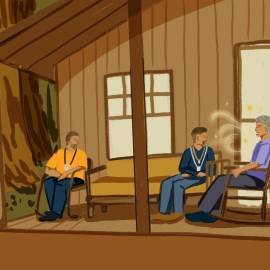
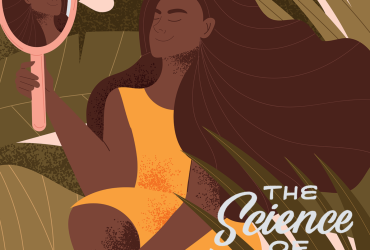
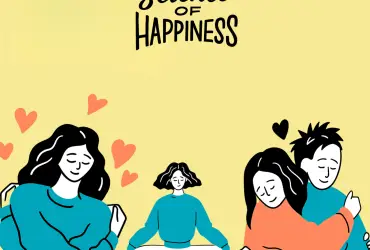
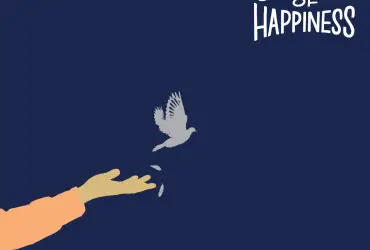

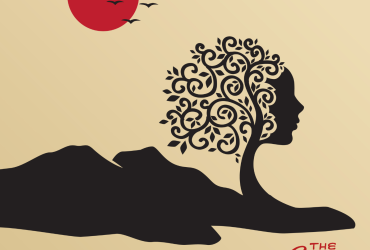
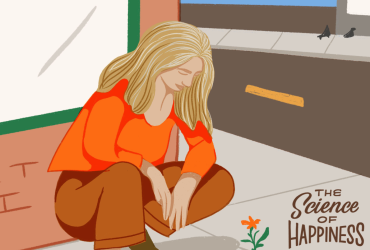
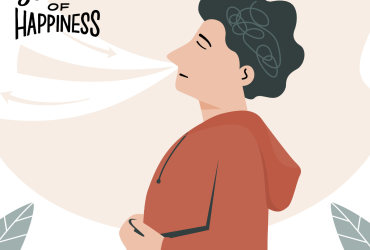
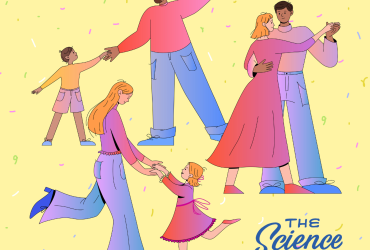
Comments